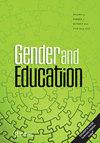‘Seeking a break from home’: investigating women’s college experiences in rural Mewat, India
IF 1.9
3区 教育学
Q2 EDUCATION & EDUCATIONAL RESEARCH
引用次数: 0
Abstract
ABSTRACT In 2018, Nuh, barely 75 km from India’s parliament, was ranked by the Government as the country’s most ‘backward’ district. It is a region fraught with many challenges including endemic poverty and simmering communal tensions, which among other factors have contributed to historically limiting women from pursuing higher education or building career aspirations. While the state has attempted to correct this by building new colleges, this paper explores how women experience and navigate these college spaces. Using a critical feminist lens, it seeks to understand the social and cultural possibilities that college life and higher education have in their lives. Findings suggest that while there are major restrictions on social agency within their everyday life, college emerges as a liminal space that provides an ‘escape’. The college space for these women offers possible pathways of imagination, dialogue, solidarity and support, all forming the complex matrix of their future possibilities.“离家出走”:调查印度梅瓦特农村女性的大学经历
摘要2018年,年仅75岁的Nuh 距离印度议会公里,被政府列为该国最“落后”的地区。这是一个充满许多挑战的地区,包括地方性贫困和酝酿中的社区紧张局势,这些因素在历史上限制了妇女接受高等教育或建立职业抱负。虽然国家试图通过建设新的大学来纠正这一问题,但本文探讨了女性如何体验和驾驭这些大学空间。它运用批判的女权主义视角,试图理解大学生活和高等教育在他们生活中的社会和文化可能性。研究结果表明,虽然他们的日常生活中对社会中介有很大的限制,但大学是一个提供“逃离”的边缘空间。这些女性的大学空间提供了想象、对话、团结和支持的可能途径,所有这些都构成了她们未来可能性的复杂矩阵。
本文章由计算机程序翻译,如有差异,请以英文原文为准。
求助全文
约1分钟内获得全文
求助全文
来源期刊

Gender and Education
EDUCATION & EDUCATIONAL RESEARCH-
CiteScore
5.20
自引率
9.10%
发文量
31
期刊介绍:
Gender and Education grew out of feminist politics and a social justice agenda and is committed to developing multi-disciplinary and critical discussions of gender and education. The journal is particularly interested in the place of gender in relation to other key differences and seeks to further feminist knowledge, philosophies, theory, action and debate. The Editors are actively committed to making the journal an interactive platform that includes global perspectives on education, gender and culture. Submissions to the journal should examine and theorize the interrelated experiences of gendered subjects including women, girls, men, boys, and gender-diverse individuals. Papers should consider how gender shapes and is shaped by other social, cultural, discursive, affective and material dimensions of difference. Gender and Education expects articles to engage in feminist debate, to draw upon a range of theoretical frameworks and to go beyond simple descriptions. Education is interpreted in a broad sense to cover both formal and informal aspects, including pre-school, primary, and secondary education; families and youth cultures inside and outside schools; adult, community, further and higher education; vocational education and training; media education; and parental education.
 求助内容:
求助内容: 应助结果提醒方式:
应助结果提醒方式:


